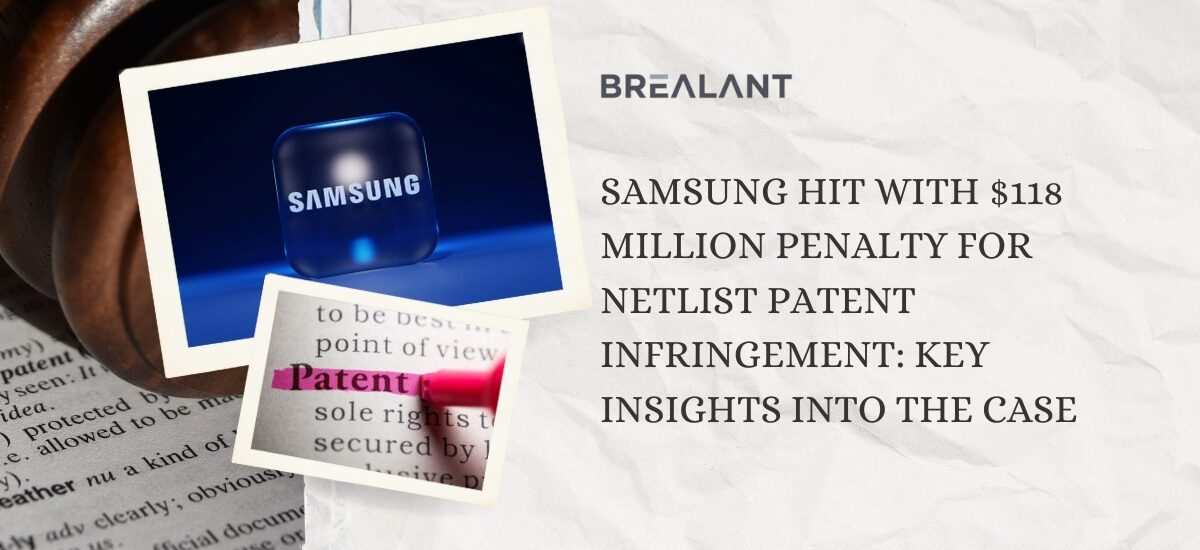



Samsung Electronics Co., Ltd. was forced to pay $118 million to Netlist Inc. for patent infringement in a recent court decision that has caused a stir in the IT sector. The decision serves as a crucial warning of the repercussions of stealing protected technology and emphasises the significance of intellectual property (IP) protection in the quickly changing IT sector. This blog examines the case’s specifics, ramifications, and wider takeaways for IT firms negotiating the complex realm of patent law.
A California-based company, Netlist Inc., specialises in memory and storage solutions. Data centres and other high-performance computer applications may now operate more effectively thanks to a portfolio of cutting-edge technologies created by Netlist, which was founded in 2000. Advanced memory module designs are among its patented inventions and are now essential components of contemporary computer systems. Samsung is an apex player in memory and semiconductor technologies worldwide, was in hot water after Netlist claimed that the South Korean behemoth had violated many of its patents. Samsung’s unapproved use of Netlist’s proprietary memory module technology was at the heart of the accusations. In items that brought in a lot of money, Samsung used its intellectual property to its advantage for years, according to Netlist.
Several of Netlist’s patents were at the centre of the lawsuit, but one in particular was a patent on memory modules that improve computer systems’ performance and efficiency. This unique technique is especially useful in applications like cloud computing and artificial intelligence (AI) since it significantly increases the speed and power efficiency of memory modules. In addition to using this copyrighted technology without authorisation, Netlist claimed that Samsung had neglected to credit Netlist for its efforts. As a result, the business filed a lawsuit to recover damages for the unapproved use of its intellectual property.
The case ended with a jury trial in the US District Court for the Eastern District of Texas. After hearing arguments from both sides, the jury decided that Samsung had violated Netlist’s patents and decided in favour of Netlist. As restitution for the unlawful use of its technology, Netlist was given $118 million. Evidence that Samsung may have known about Netlist’s patents beforehand and decided to use the technology without obtaining the necessary license agreements was one of the main elements that influenced the verdict. This supported the claim that Samsung’s actions were deliberate, which helped to justify the hefty fine.
Though the $118 million fine is a major financial setback, Samsung will suffer more than just financial losses. The decision may affect Samsung’s standing with partners and consumers as well as its reputation. Being a significant force in the IT sector, Samsung’s reputation is largely dependent on its capacity to innovate while upholding others’ intellectual property rights.
Furthermore, the decision may lead to more investigation into Samsung’s business practices and possibly more lawsuits from other businesses with related complaints. The case also serves as a clear warning of the dangers of intellectual property battles, which may be expensive and harm a company’s reputation.
The Samsung-Netlist lawsuit teaches businesses in the digital industry several important lessons:
∙The Value of IP Due Diligence: Before integrating new technology into their goods, businesses must make sure they carry out comprehensive IP due diligence. To prevent legal issues, this entails locating possible patent overlaps and obtaining the required license agreements.
∙Appreciating Smaller Innovators: Big businesses ought to acknowledge and value the contributions made by startups and smaller businesses. Working together with innovators through partnerships or license agreements can promote growth for both parties and avoid expensive legal action.
∙The Function of Legal Protections: Patents are essential to innovation because they give creators the security and rewards, they need to create new technology. The significance of strong legal frameworks in defending intellectual property rights is shown in this case.
∙Impact of Wilful Infringement: This case’s determination of wilful infringement highlights the necessity for businesses to proactively handle any intellectual property disputes. IP claims that are ignored or rejected can lead to serious financial fines as well as harm to one’s image.
Samsung was fined $118 million for violating Netlist’s patents, which illustrates how serious intellectual property issues are in the IT sector. Protecting inventors’ rights and maintaining fair competition is crucial because invention propels advancement. Companies of all sizes should take note of this case, which emphasises the need for vigilance, teamwork, and adherence to intellectual property regulations. Companies’ approaches to innovation and intellectual property will surely be influenced by the lessons learnt from this case as the IT sector develops. For Netlist, the win represents a turning point that confirms its position as a major force in memory and storage technology. Secure your brand’s unique identity by patenting it, and learn more about the nuances of intellectual property from Brealant.